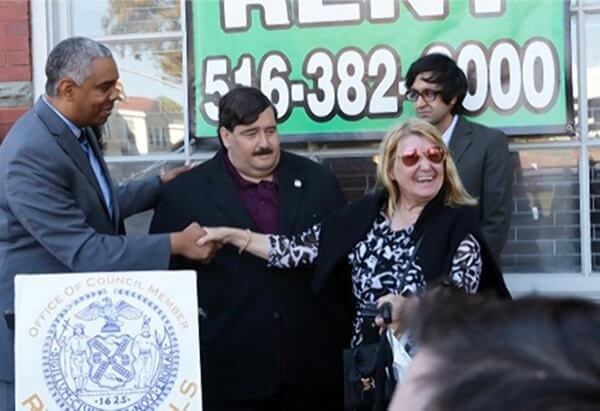By Gina Martinez
South Queens residents used a town hall meeting to voice their disdain for the proposed Ozone Park drop-in center. The meeting, hosted by Councilman Ruben Wills (D- Jamaica) was filled with tension.
Residents were totally against the proposed 100-32 Atlantic Ave. transitional home, just 250 feet away from the High School for Construction, Trades, Engineering and Architecture, saying the quality of life would drop and threatened the safety of the children.
The proposed transitional home would be run by the non-profit Breaking Grounds, which has several locations in all five boroughs. Breaking Grounds is a street outreach program that provides supportive temporary housing to the homeless while helping them find permanent housing. During their stay, the organization provides them with food, medical care and a place to sleep.
The panel of workers from the city Department of Homeless Services and Breaking Grounds tried to have an open conversation with residents but were constantly interrupted by jeers and chants saying “Put the shelter by your house!” and “Liar” most of the time they spoke. The frustrated crowd of about 150 people would randomly start yelling and groaning incoherently anytime something was said that was not agreed upon.
Wills acted more like a referee than a host, having to remind the crowd to allow the panel to finish answering questions at least 25 times throughout the night. Toward the end of the night Wills and the panel appeared to give up trying to have a civil conversation.
The biggest concern about the shelter was its proximity to the high school and the threat of sex offenders. DHS reassured residents that any possible sex offenders would be screened, but that was not enough to calm the crowd.
During the Q&A segment the same question was asked at least 10 times by members of the audience and received the same answer. Residents kept asking why this location? They were told repeatedly that different locations were scouted, but this fit the criteria for space, an answer that enraged the crowd.
A representative for DHS told the crowd that the agency’s decision was not finalized for this location and it was willing to look elsewhere, but so far the Atlantic Ave. site was the best suited for the drop-in center. He said winter is coming and a decision has to be reached soon, and so far there were no better alternatives.
Towards the end the DHS and Breaking Ground workers were clearly tired and refused to repeat themselves.
Marian Moore, assistant commissioner for street outreach for DHS, explained the difference between the drop-in center and a homeless shelter. She said the drop-in center was meant to combat homelessness in the area, not just house people without a place to live.
“The main primary focus of outreach is to get those folks off the street,” she said. “Those folks may be older adults who are medically frail so within the Queens community right now we don’t have any facilities to meet their needs, we don’t have any drop-ins, we don’t have any safe havens. Oftentimes the street homeless won’t go in a shelter for different reasons and we like to provide a threshold for them so they can come inside and get off the street. Sometimes these models actually save lives. It’s a warm space, a place where they can come in and shower , talk to someone and get services, get connected to income entitlements , and eventually get housing. That’s our main goal.”
Stanley Shuckman, the owner of the shopping center directly across the proposed drop-in center, told the panel that he appreciated the proposal but just not in that location.
“I believe all of the people here are here because they have big hearts,” he said. “They’re worried about their families and their communities. Knowing that these people took the time to come here is proof that everyone of them feels exactly as you do about your program, except you re just putting it in the wrong place.” He offered to help DHS and Breaking Grounds find an alternative location, much to the delight of residents. DHS agreed to talk to work with him.
At the end of the meeting it was clear that people were not satisfied. DHS and Breaking Grounds promised to continue to look at alternative sites, but made it clear that if they could not find one soon, more than likely the Ozone Park location would be converted into a transitional home this winter.
Reach Gina Martinez by e-mail at gmart




































